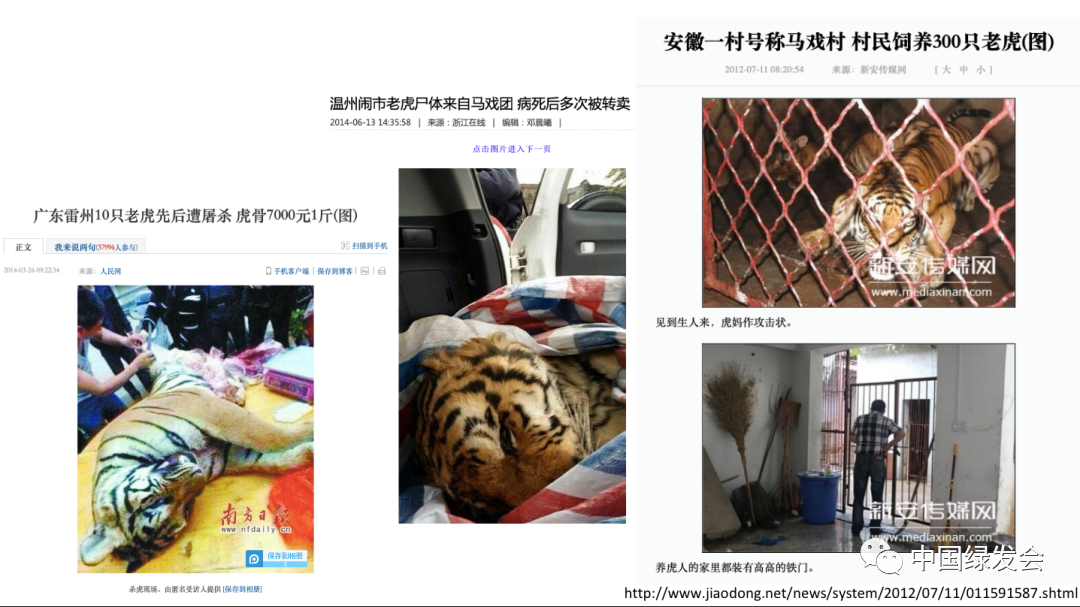China Biodiversity Conservation and Green Development Foundation (CBCGDF)’s Endangered Species Special Fund’s Saving Animal Show Project advocates humane and scientific treatment of animals and is committed to improving animal welfare, captive wild animals, and promotes an end of the animal show. This time, we have put forward a proposal to ban tiger performances during the Two Sessions.
Wild tigers face problems such as habitat shrinkage and fragmentation, illegal poaching and lack of prey. Since the 1980s, many tigers have been bred in captivity in China, and their number has far exceeded the number of wild tigers. Due to the current management mechanism's lack and irregularity, there is excessive commercial use of living tigers and tiger products, increasing the demand for tiger utilization. It also increases the threat of poaching, smuggling, and illegal trade in tiger products, endangering wild tigers' safety around the world.

As early as 2010, the Ministry of Housing and Urban-Rural Development of China issued a notice on the industry of zoos and the “National Outline for the Development of Zoos”, which required zoos to put an end to all forms of animal shows and stop zero-contact. However, it is not mandatory, so the implementation effect is low. The display and utilization of wild animals represented by tigers are still full of false examples of close contact between humans and tigers. It is an entertainment behavior with no scientific and educational significance, which is not conducive to wildlife protection and ecological civilization construction. The specific issues are as follows:
1. Performance venues are mostly temporary venues without professional evaluation
According to statistics from non-governmental public welfare projects on online information sources of wildlife movement show, during 282 wildlife show activities from June to December 2020, about 177 tigers were roaming the streets. Among them, 64.4% were in non-professional and non-fixed venues such as real estate marketing centers, like Evergrande, Xintown Holdings and Country Garden. These public performance venues do not meet industry standards, such as the "Technical Regulations for the Management of Wild Animal Feeding (Siberian Tigers)" (LY/T 2199-2013). They are poorly equipped and have not been professionally evaluated, posing potential public safety risks.
2. Poor management increases the cost of administrative management and law enforcement
Tigers are all wildlife under first-class state protection. The National Forestry and Grassland Administration (NFGA) has the power of examination and approval, while the Grassland Departments have the right to inspect the law. There is an information imbalance between the two, which increases administrative management and law enforcement costs. The majority of unauthorized wildlife performances have not been subjected to administrative punishment in accordance with Article 48 of the "Wildlife Protection Law of the People's Republic of China" and are dismissed as having caused no severe social harm.
3. Poor management of tigers’ special mark and the illegal trade continues
From the case of eating tigers in Leizhou in 2014 and the Jilin trial of the tiger carcasses' illegal trade in 2020, we can see that the lack of tiger-specific labeling and monitoring of the flow of individual animals. These conditions provide an opportunity for the tigers' illegal trade and increase the threat of poaching of wild populations. The Seventh Central Inspection Group for Ecological and Environmental Protection reported back to the NFGA that policies and systems are not strong enough to promote ecological protection. In 2018, the State Council's "Notice on Strict Control of the Trade and Utilization of Rhino and Tiger Products" (Guo Fa [2018] No. 36) had aroused widespread controversy. On 13 December 2018, Huang Caiyi, the National Forestry and Grassland Administration Spokesperson, announced that the implementation rules would be suspended. Tiger bone and rhino horn would continue to be strictly prohibited from being used as medicine. But the notice has not been repealed, changing from "prohibited" to "strictly controlled".
Suggestions:
1. Tiger performances and close/zero contact are explicitly prohibited to ensure both human's and animals' safety. In particular, the exhibition and utilization of terrestrial wildlife should be explicitly prohibited in shopping malls, real estate buildings, streets and other non-fixed, non-professional places that do not meet the relevant standards for wildlife feeding. Refer to Article 7 of the "Decision of the Standing Committee of the Zhejiang Provincial People's Congress on the Comprehensive Prohibition of the Illegal Trade and Abuse of Wild Animals" and "Notice of Fujian Provincial Forestry Department on Printing and Distributing the Measures for the Administration of Wildlife Show of Fujian Province" (Minlin [2016] No. 16)
2. Commercial breeding for tiger performance shall be explicitly prohibited. The issuance of artificial breeding licenses, operation and utilization licenses, business licenses, approval documents and special marks of wild animals for animal performance and utilization shall be stopped entirely.
3. Establish a supervision system for the whole process of wildlife display and product utilization, including strict examination and approval in advance, transparent and open, encouraging social supervision, surprise on-site inspection during the event, unimpeded public reporting, strict punishment following the law after, etc.
4. By the requirements of administrative licensing and administrative penalty double publicity and publicity standards, it is recommended that the State Forestry and Grassland Administration improve the publicity of information disclosure, including the main content of the license, special animal’s mark and other information, and virtually guarantee the traceability of wild animals in accordance with the law.
5. Tiger breeding and utilization units shall publicize the flow of animals and ensure that the animals are traceable in accordance with the law. Refer to Article 24, paragraph 9 of the "Regulations on the Protection and Management of Beijing Wildlife".
Translator/ Syying C
Original Chinese Article
https://mp.weixin.qq.com/s/TVfZQgTTx0Uu6rgPkA2Eaw
Contribution
https://www.paypal.me/CBCGDFChina
http://www.cbcgdf.org/English/ConfirmDonaTion/0.html
